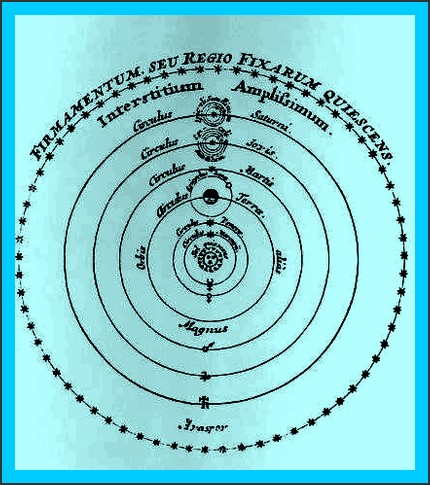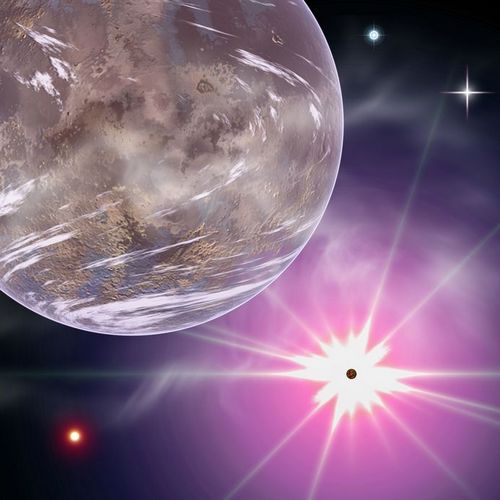
Breaking Out from Earth's Shell
by Sylvia Engdahl
Long ago people literally believed that an invisible, transparent shell surrounded earth to hold up the stars. After that theory was discarded, the shell remained in a figurative sense, for Earth was thought to be forever isolated from the rest of the universe. Some people are comforted even today by this illusion, although it's time for humankind to break free. (This essay also appears at the Lifeboat Foundation's website, with different pictures. The one here at left shows the solar system as Copernicus imagined it, with the sun at the center and the stars in a sphere outside the spheres of the planets, which are indicated by their Latin names.)
*
Since the dawn of history humans have been drawn to the idea of reaching the heavens. Most cultures' gods were presumed to dwell there. The stars have always symbolized mankind's highest aspirations. They were, however, viewed as inaccessible, except perhaps by souls after death.
According to the worldview universally accepted in Europe prior to the seventeenth century, the realm of the fixed stars (as distinguished from planets) was literally perfect and unchanging. The stars were thought to be embedded in an invisible sphere--a shell--that encircled Earth, for if they were not attached to something, would they not fall? Contrary to a common misconception, the theory that Earth is not the center of the solar system was not resisted because of any sense of demotion from the place of prime importance, or even because of conflict with the Bible--actually, it would not have aroused much opposition if the authorities of the time had not realized, more than fifty years after its publication, that it opened the door to questioning the nature of the stars. Copernicus himself never doubted the accepted theory; to him, they were still firmly attached to a crystal sphere surrounding the sun.

The philosopher Giordano Bruno was the first person to say that the stars are distant suns rather than mere lights fixed to a sphere surrounding Earth.
However, near the end of the sixteenth century the philosopher Giordano Bruno, a strong advocate of the Copernican theory, suggested for the first time that the stars are not mere lights in the sky, but suns with planets of their own. Although that was not his only heresy, many scholars believe it was the primary reason why he was burned at the stake, and why, after his books were banned, supporters of his astronomical ideas called themselves Copernicans instead of mentioning his name. Rearrangement of the solar system was a relatively minor issue compared to the upheaval in both science and religion caused by denial of the stars' perfection.
To people who had believed themselves safely enclosed within a perfect sphere, beyond which lay Heaven, the idea of a universe full of suns at random distance from Earth was extremely upsetting. As John Donne put it in these famous lines from his poem "An Anatomy of the World" (1611), it removed all coherence from their worldview.
And new philosophy calls all in doubt,
The element of fire is quite put out,
The sun is lost, and th'earth, and no man's wit
Can well direct him where to look for it.
And freely men confess that this world's spent,
When in the planets and the firmament
They seek so many new; they see that this
Is crumbled out again to his atomies.
'Tis all in pieces, all coherence gone,
All just supply, and all relation.
This was not a foolish or naive reaction. Human thought is dependent on a stable foundation on which to rely. Psychologically, people are cast adrift if their basic premises are questioned, and this is an adaptive trait since without anchors it would be impossible for a society to function. Change must come gradually, through the exceptional few who are able to discard the outlook of their contemporaries. Once they do, a new outlook spreads--but that takes time.
Over time, people became reconciled to the loss of an immutable order in the universe, and by the late seventeenth century those with enough education to care about astronomy envisioned countless suns, all surrounded by planets which, like those of our own solar system, were assumed to be inhabited. Some thought they were the homes of angels or the souls of the dead, but the belief that they were inhabited by mortals superior to ourselves soon predominated. The one thing everyone agreed about was that they were not without tenants. It had formerly been believed that the heavenly bodies existed for the benefit of humankind, so since distant suns and planets were of no apparent benefit to us, it was reasoned that they must have been made for other mortals. It was taken for granted that God would not have created a "useless" world. This was not questioned until the middle of the nineteenth century, when after hot debate the conviction that all extrasolar worlds have inhabitants still prevailed. Not until early in the twentieth was it abandoned.

18th-19th century people thought all planets were inhabited because they believed nothing was created without any use, but now we know of a good use for uninhabited planets.
For more than three hundred years it was believed, by educated people at least, that solar systems similar to ours exist. This is known because they are referred to in the writings not just of astronomers but of many well-known people such as Benjamin Franklin as well as in the popular magazines of the day, sermons, and even textbooks for children. Also, a great deal of poetry, some of it book-length, was written about spectacular suns and their planets. Imaginary voyages through space appear even in poems by major poets such as Milton, Shelley, and Byron.
These were spiritual voyages, not journeys in spaceships. For example, at the time of Newton's death it was often suggested that he might see distant planets on his way to Heaven. Many people longed to visit the worlds so frequently talked about, and doing so in an afterlife was the only route they could imagine. As late as the 1870s the American poet Henry Abbey wrote:
Death, that dread annulment which life shuns,
Or fain would shun, becomes to life the way,
The thoroughfare to greater worlds on high,
The bridge from star to star. Seek how we may,
There is no other road across the sky;
And, looking up, I hear star-voices say:
"You could not reach us if you did not die."
But the longing for a closer look at other worlds was not shared by everyone. Searches for information about it turn up only what was written by those who were interested in cosmic space. Many who heard of distant solar systems were not interested, or may even have been disturbed by the thought. The French philosopher Pascal famously wrote, "The eternal silence of these infinite spaces terrifies me," and he can hardly have been alone in feeling that way. It was not an issue people needed to be concerned about. Earth was, after all, safely isolated from the larger universe, as far as they knew. No one supposed that there could ever be actual contact could between worlds; it was as if an invisible shell still enclosed our own.
It is likely that the poet William Wordsworth's feeling about space was--and still is--more typical than that of the space enthusiasts. He was knowledgeable about astronomy and enjoyed watching the stars with his sister and friends. But he is best known for his love of nature. When in his famous poem "Tintern Abbey" (1798) he wrote:
Therefore am I still
A lover of the meadows and the woods,
And mountains; and of all that we behold
From this green earth. . . .
was he considering the stars a part of nature? There is no indication in the poem that he was, yet it seems unlikely that he would have used the phrase "from this green earth" rather than the more common "on this green earth" if he had never looked outward, thinking of Earth as part of the larger natural universe. And in fact in another poem, "The Stars are Mansions Built by Nature's Hand," he viewed worlds of the stars as the happy abode of the dead.
Be that as it may, it was Earth alone that he cared about. In "Peter Bell," describing his return from a fantasy space journey within our solar system, Wordsworth revealed an outlook that is shared by many today, more than two hundred years later.

The poet William Wordsworth enjoyed watching the stars from Earth, but unlike many educated people of his era he did not long to visit them.
Swift Mercury resounds with mirth,
Great Jove is full of stately bowers;
But these, and all that they contain,
What are they to that tiny grain,
That darling speck of ours!
Then back to Earth, the dear green Earth:
Whole ages if I here should roam,
The world for my remarks and me
Would not a whit the better be;
I've left my heart at home.
See! there she is, the matchless Earth!
There spreads the fam'd Pacific Ocean!
Old Andes thrusts yon craggy spear
Through the grey clouds--the Alps are here
Like waters in commotion. . . .
And see the town where I was born!
Around those happy fields we span
In boyish gambols--I was lost
Where I have been, but on this coast
I feel I am a man.
The last few lines say it all: for the vast majority of people, their very identity depends on their presence on Earth. To leave it in fantasy is one thing, but to be aware that people can really leave, really venture into unknown regions, puts a whole new face on facts that have been known for centuries. And when astronauts do leave, even they are often more deeply moved by the sight of "the dear green earth" from a distance than by the beauty of the stars. While astronauts are exceptional individuals who enjoy space flight and long to explore the universe, those are not the emotions the public vicariously shares.
The farther we go in space, the further removed space travel is from theory, the more evident this will become. In Wordsworth's time and for two centuries longer, the idea that there might be peril in space didn't occur to people. Their knowledge of the universe was very abstract. Even the few brief mentions of traveling to the stars that appeared in the late nineteenth century did not suggest that it would be dangerous, and certainly there was no suspicion that the presumed inhabitants of other worlds might not be friendly. That notion was introduced by H. G. Wells' 1897 novel The War of the Worlds, which was viewed as pure fantasy until a 1938 radio dramatization was broadcast in the form of a news report, nearly causing a panic. Science fiction of the 1920s was read only by those especially interested in ideas about the future. However, starting in the 1930s, the hit comic strip and radio adventures of Buck Rogers forever changed the public's perception of space. It became the scene of violent action and exciting new concepts, and the development of V-2 rockets in World War II led to a suspicion that there might possibly be some truth in them.
Thus the first UFO sightings, which occurred in 1947 and were immediately associated with extraterrestrials, were followed by countless alien invasion movies in the 1950s. It is often said that these movies were actually about the Cold War, and no doubt their plots were influenced by it; but I believe that underneath, they reflected the public's new realization that space may hold terrors. These films featured ridiculously-portrayed aliens and some were intentionally humorous, which suggests that viewers wanted to think that the whole idea of danger from beyond Earth was silly. When the development of satellite technology began to show that space travel is not silly, their popularity waned. People turned their attention to the competition in space, which really was connected to the Cold War. After America won they could no longer be distracted by it, and the worries suppressed so long began to surface along with growing anxiety about our own ventures into the unknown.

The Challenger disaster triggered unconscious apprehension about space that had been building up in the public mind ever since Apollo.
At the time of the Challenger disaster I was astonished by the widespread public feeling that it meant space travel shouldn't be undertaken, and especially that the civilian teacher Christa McAuliffe shouldn't have been "sent" into space, as if she hadn't been chosen out of thousands of applicants who vied for the chance to go. The supposition, sometimes even explicitly stated, that she hadn't known it was dangerous was an insult to her courage and to her intelligence. Who could possibly be unaware that riding in a spacecraft propelled by rocket engines and boosters providing 7.8 million pounds of thrust at liftoff involves risk?
Perhaps previous space flights had been viewed with a sense of detachment, as if they were science fiction. But I now think there was more to it than that. It would simply not have been rational for anyone ever to think space travel isn't dangerous; the evidence that it's unsafe could hardly have come as a surprise. And even if it did, dangers involving far greater numbers of people, such as those of early aviation, had been accepted by the public without question. No one said that pilots shouldn't be allowed to take off in primitive planes, although the crash rate was extremely high. Planes, however, did not get very far from the ground. There was no possibility that improved ones would leave the planet and enter unknown regions beyond. I suspect that the realization that space travel is real came not with the tragedy of Challenger, but with the Apollo moon flights, and that Challenger brought to the surface unconscious feelings that had been building up for a long time. Underneath, people were troubled not by the danger to the astronauts but by the potential perils of contact with the wider universe. The Challenger disaster was merely the trigger for expression of the public's growing uneasiness about spacefaring.
As in the seventeenth century, for people to shrink from the necessity of revising their perception of our environment (our total environment, not the mere biosphere) is normal and adaptive for our species. If everyone's orientation shifted suddenly, society would disintegrate. Civilization depends on the ability to make plans knowing that for the short term, tomorrow will be like today. Thus changes in outlook come slowly, first in a few visionaries, later in one generation after another as minds open to new awareness. Mass media, a recent phenomenon, will speed up the process but cannot make it happen overnight. If anything, real-time mass media events such as the moon landings produce more shock than lasting transformation.
So it can't be expected that the public will be quick to support future space activity. We should not be surprised if more interest is shown in science fiction movies than in real flights. Inwardly drawn to the thought of venturing beyond Earth but unable to break away from the safe and familiar, people tell themselves that the fiction they enjoy is mere entertainment, not be taken seriously. Though science fiction is sometimes criticized for promoting unrealistic dreams, more likely it serves to assure the average moviegoer that they are just dreams, while inspiring the visionary minority to work toward making them come true.
Will we always be bound to Earth, then? Of course not. Evolution is slow, but it can't be halted. Humans have been seeking new lands to settle for millennia, first new villages, and eventually new continents. The negative expression of this instinct has been the urge to expand a group's territory through war, which hopefully most of us have outgrown since the times when young men dreamed of glorious conquest. On the positive side, there has always been a desire of ordinary people to be pioneers, even at the cost of hardship. For some time it has been evident that Earth has, or soon will, run out of vacant land. How could there not be an impulse to go beyond, quite apart from the plain fact that a species that fails to move beyond the niche in which it has evolved must be periodically decimated or else become extinct? In the long run, how could humankind fail to follow that impulse?

it is a human instinct to move forward into unfamiliar new lands despite hardship and danger .Our descendants will do it. just as our ancestors did.
The dream of extending our species' range beyond the world on which we evolved is hardly something so trivial as entertainment, however much entertainment may be derived from it or how gradually it is absorbed. It is an often-unconscious expression of the deep-seated instinct present in all species to expand their ecological niche, an adaptive response to the ever-present threat of extinction. It has become trite and unfashionable to compare movement beyond Earth to the movement of life from the sea onto land, as was done during the Apollo era, but that comparison is still valid.
These are not new ideas--space advocates have been expressing them for years. Why then have so many lost sight of them and become discouraged? I think it is because in our era people are so used to rapid change, and to instant gratification of their wishes, that they have lost all sense of the evolutionary timescale. A dream is not unrealistic merely because it is not achieved within one's own lifetime or even that of one's grandchildren. Enthusiasm for one ambitious space dream after another has died out when its supporters came up against the fact that they wouldn't live to see it fulfilled--a reaction that strikes me as all too close to "sour grapes." As has often been pointed out, settling space is not as simple as picking up stakes and moving one's family westward. It requires a very long lead time. During that time, the clock would stop if there were no far-sighted dreamers willing to pay the price of personal disappointment in order to keep it going. The more followers they can attract by offering entertainment, the better; but to suppose that their motivation has no deeper roots is to ignore the essence of what enables our species, or any species, to thrive.
Sooner or later, like an eaglet destined for flight, humankind will break through the invisible shell in which our planet has been confined. It is happening now with the advent of commercial space flight, and the minority with far sight will carry us forward despite reluctance on the part of the majority. In times to come men and women will travel far from this green earth. And then, with our ancestral home at last open to the universe, we will discover our place among the countless worlds of the stars.
Copyright 2019 by Sylvia Engdahl
All rights reserved.
This essay is included in my books .From This Green Earth: Essays on Looking Outward and Selected Essays on Enchantress from the Stars and More.